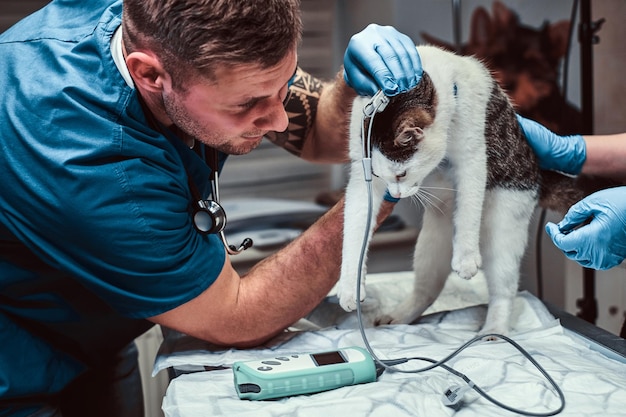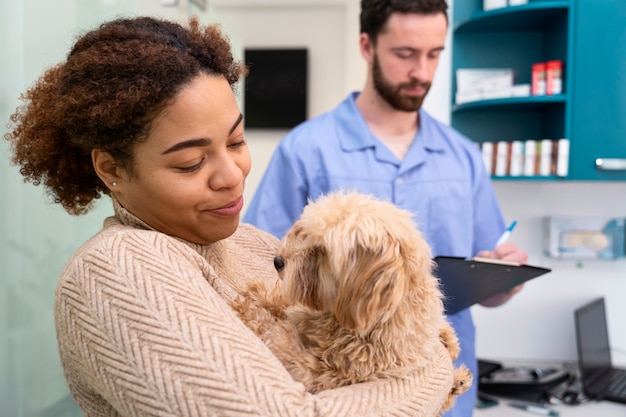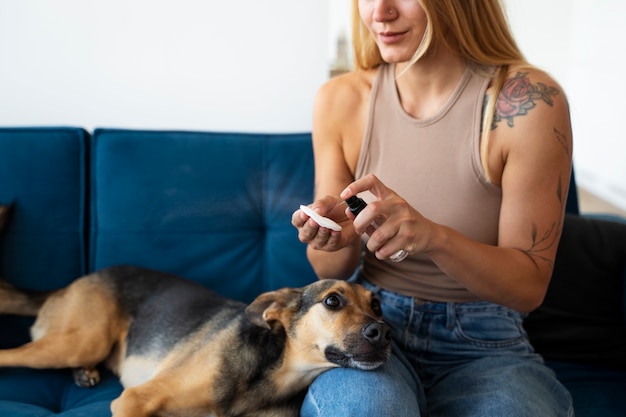What To Expect During Pet Laceration Repair Surgery

What To Expect During Pet Laceration Repair Surgery
When your pet suffers a deep cut or wound, panic and worry are natural reactions. You want to stop the bleeding, ease their pain, and make sure they get the best care possible—especially if the injury happens outside regular veterinary hours. At VetCheck Pet Urgent Care Center - Carmel, located at 1374 South Rangeline Road, Carmel, IN 46032, we understand how distressing these moments can be. Our emergency veterinarians are here to provide urgent, expert wound care whenever your regular vet is unavailable; walk-ins are always welcome and no appointment is needed.
This blog will guide you through what happens during pet laceration repair surgery, from recognizing when your pet needs help, to understanding the surgical process and what recovery will look like. You will discover how our urgent care veterinary team manages pain and infection, what to expect during your visit, and how we support your pet’s healing every step of the way. We’re proud to offer pet laceration repair surgery in Carmel and surrounding communities, so you can feel confident knowing your pet’s urgent needs are always covered. If you ever find yourself searching for an “emergency vet near me,” VetCheck is here when you need quick, compassionate care. You can learn more about our laceration repair surgery services for pets who need prompt wound treatment.
Recognizing When Your Pet Needs Emergency Laceration Repair
Accidents can happen in an instant—whether it’s a playful romp that ends with a sharp branch, a fence mishap, or a scuffle with another animal. Knowing when your pet’s wound needs immediate veterinary intervention is crucial. Key symptoms that indicate your pet may require emergency pet wound treatment include persistent bleeding that does not stop after several minutes of gentle pressure, wounds that are deep or appear to expose muscle or bone, visible dirt, debris, or foreign objects embedded in the wound, and wounds located near sensitive areas such as the eyes, mouth, or joints. Additional warning signs include swelling, redness, or heat around the wound, as well as sudden changes in your pet’s behavior like limping, excessive licking, or vocalizing pain.
For pet owners in Carmel and surrounding areas, these symptoms should prompt a swift response. If you notice any of these signs, it is essential to seek emergency veterinary care right away—especially if you find yourself searching for an "urgent care vet near me" after hours or on weekends. Remember, walk-ins are welcome at VetCheck Pet Urgent Care Center - Carmel, so you never have to wait for an appointment when your pet’s health is on the line.
Why Do Pets Need Laceration Repair Surgery?
Understanding the causes and risks of pet wounds helps you appreciate why timely surgical repair is important. Pets can suffer lacerations for many reasons. Common causes include sharp objects like glass, metal, or sticks, animal bites or scratches, accidents around the home or yard, and trauma from car accidents. Some breeds are naturally more adventurous or inquisitive, increasing their risk of injury. Environmental factors in Carmel, such as icy sidewalks in winter or active outdoor play in local parks, can also contribute to accidental cuts and wounds.
Lacerations are more than just surface injuries. Deep wounds can damage underlying tissues, nerves, and blood vessels. Without prompt treatment, these wounds are highly susceptible to infection from bacteria, dirt, or saliva; untreated infections can quickly become serious, especially in areas with poor blood flow or near joints. The risk of complications such as abscess formation, delayed healing, or even systemic illness increases when wounds are not properly cleaned and surgically closed.
Our veterinary professionals emphasize that early intervention is key; seeking pet laceration repair surgery in Carmel as soon as possible can significantly improve your pet’s recovery and comfort. Immediate care also reduces the likelihood of scarring and long-term mobility issues, helping your pet get back to their normal, happy self.
What Happens During Pet Laceration Repair Surgery?
When you arrive at VetCheck Pet Urgent Care Center - Carmel for pet laceration repair surgery, you can expect our emergency veterinary team to respond quickly and compassionately. After initial triage, we will assess your pet’s wound and overall health, using advanced in-house diagnostics if needed to check for deeper injuries or underlying issues.
Initial Evaluation and Pain Management
Our first priority is to keep your pet comfortable and stable. Immediate steps include gentle restraint to prevent further injury, assessment of vital signs, and administration of pain relief or sedation if your pet is anxious or in distress. We may also recommend antibiotics to reduce infection risk, especially for severe or contaminated wounds.
Cleaning and Surgical Preparation
The next step involves thoroughly cleaning the wound area. This process includes clipping away fur around the laceration, flushing the wound with sterile solution to remove debris, and carefully evaluating the extent of tissue damage. If the wound is contaminated or older, our veterinarians may need to remove damaged tissue to promote healthy healing—a process called debridement.
Surgical Repair and Closure
Once the wound is clean and prepared, our team will use appropriate surgical techniques to close the laceration. This often involves suturing the deeper tissue layers and the skin to restore normal structure and function. Special attention is given to minimizing tension on the wound to encourage proper healing. In some cases, drains are placed to prevent fluid accumulation, and absorbable sutures may be used so that removal is not required later.
Post-Operative Monitoring and Recovery
After surgery, your pet will be monitored as they recover from anesthesia. Our veterinary professionals will check vital signs, assess pain levels, and ensure your pet wakes up comfortably. Depending on the injury’s severity and your pet’s overall health, we may recommend full or partial day hospitalization for observation and continued care. You will receive detailed instructions on caring for your pet at home, including wound management, medication administration, and signs to watch for that may indicate complications.
Seeking pet laceration repair surgery in Carmel ensures your pet’s wound is expertly cleaned, closed, and protected from infection, setting the stage for optimal healing.
Home Care and Prevention After Laceration Repair
Your involvement in your pet’s recovery is just as important as the surgery itself. Following your veterinarian’s advice helps prevent complications and supports faster healing. Steps for home care typically include keeping the wound clean and dry, monitoring for swelling, redness, or discharge, administering prescribed medications exactly as directed, and preventing your pet from licking or scratching the wound—often with the help of an Elizabethan collar or recovery suit.
It’s also important to limit your pet’s activity as recommended, avoiding running, jumping, or rough play until the wound has fully healed. Regularly check the incision site for any signs of delayed healing, and promptly report any concerns to our veterinary team. When you follow these instructions and attend any recommended follow-up visits, you help minimize the risk of infection or wound breakdown.
Prevention of future injuries involves providing a safe environment for your pet. Inspect your home and yard for sharp objects, supervise interactions with other animals, and use caution during outdoor adventures. For pets with allergies or skin conditions, regular veterinary care can help reduce scratching and minimize the chance of self-inflicted wounds. If you are concerned about allergies playing a role in your pet’s skin health, our pet allergy management services may be helpful.
When Should You Seek Emergency Veterinary Care for a Pet Wound?
Knowing when to seek professional help is critical for your pet’s health and safety. In general, you should bring your pet to an urgent care or emergency vet if the wound is bleeding heavily and does not stop with gentle pressure after several minutes, is deep or larger than an inch, exposes underlying tissues, has debris or dirt that cannot be easily removed, appears infected with swelling, heat, redness, or pus, is the result of an animal bite, or is located near the eyes, ears, or genitals.
Additionally, if your pet is limping, seems unusually lethargic, refuses to eat, or shows signs of pain, prompt examination is important. In these situations, searching for an “emergency veterinarian near me” or “urgent care vet near me” in Carmel should lead you to a trusted team like VetCheck Pet Urgent Care Center - Carmel. Remember, our clinic welcomes walk-ins and provides immediate care when your regular vet is closed or fully booked.
Prompt action can make all the difference—delaying treatment could put your pet at risk for infection, delayed healing, or more extensive surgery later on. Our emergency and urgent care services are available to help your pet get the care they need, when they need it most.
Compassionate, Immediate Care for Pet Lacerations in Carmel
Facing a pet injury can be overwhelming, but you do not have to navigate it alone. At VetCheck Pet Urgent Care Center - Carmel, we are committed to providing rapid, expert pet laceration repair surgery in Carmel and nearby communities. Our highly trained emergency veterinary team is here to manage pain, prevent infection, and support your pet’s recovery—day or night.
If your pet experiences a cut, bite, or deep wound, don’t wait. Walk-ins are always welcome, with no appointment needed, and we are open during evenings, weekends, and whenever your regular veterinarian is unavailable. If you are searching for an “emergency vet near me” or need urgent pet wound treatment in Carmel, our team is ready to help.
For answers to your questions or immediate assistance, call us at (317) 516-0707 or visit 1374 South Rangeline Road, Carmel, IN 46032. To explore our full range of laceration repair surgery services or learn about other treatment options for pet wounds, our veterinary team is always available to support you and your pet with compassionate, skilled care. Your pet’s health and comfort are our top priorities—let us be your trusted urgent care partner whenever emergencies arise.
Medical Disclaimer: This blog is intended for informational purposes only and is not a substitute for professional veterinary advice. If your pet has a wound or is in distress, please seek immediate veterinary attention. For more information about pet wound care, visit reputable resources such as the American Veterinary Medical Association.



















